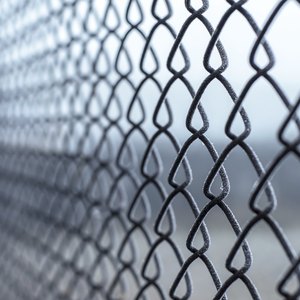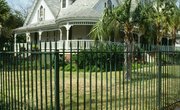
Fencing your yard contributes to your home's "tax basis." This means it only provides a tax break when you sell your home. Until then, you cannot deduct the cost of building a fence. The IRS implements a few additional restrictions that may not allow you to add the cost of building a fence to your tax basis, such as if you repair an existing fence or do the work yourself.
Tips
Fencing a residential, non-rental property is not immediately tax-deductible. However, it could give you a tax break when you sell your home in the future.
Home Improvements and Your Tax Basis
IRS Publication 530 specifically lists "building a fence" as an example of a home improvement. Home improvements cannot be deducted from your taxes. However, they add to your home's "tax basis," which means you won't have to pay tax on the value of an improvement when you sell your home.
You bought your home for $200,000 and then spent $50,000 on home improvements – including building a fence. You sell the home for $300,000. Instead of paying taxes on the full $300,000 sale price, you can deduct the tax basis: the original cost of the home plus the cost of the home improvements. $300,000 minus a tax basis of $250,000 leaves you with just $50,000 profit subject to tax.
Repairs Are Not Improvements
Note that the IRS differentiates between a repair and an improvement. If you purchase a home that has an existing fence in disrepair, you cannot add the cost of fixing the fence to your tax basis. Repairing it is considered maintaining the home in an "ordinary, efficient operating condition."
Replacing rotten wood on the fence or paying someone to stretch the sagging chainlink would be considered repairs. Completely removing the old fence and building a brand new one may be considered an improvement if the new fence is significantly different from the old fence and therefore adds to the value of the home. Talk to your tax adviser about your specific situation to confirm.
Both Materials and Labor Count
When calculating how much to add to your tax basis after building a fence, you can add the cost of the fence materials and professional labor. You can also figure in the cost of rental equipment, like an auger. However, you cannot put a price on your own labor.
If you happen to own a fence-building company and want to build a fence in your own yard, consult your tax adviser about how to proceed so that you can add the labor to your tax basis.
Only One Fence Improvement Allowed
You can only add the cost of building a fence to your tax basis one time. However, you can use the most recent fence improvement costs.
You bought a house 15 years ago with no fence. You had a picket fence installed shortly after purchasing the home. Now, you've replaced that fence with a six-foot privacy fence. The cost of the first fence is removed from your tax basis, and the cost of the second fence is added instead.
Rental Property Depreciation Deductions
According to IRS Publication 527, you can deduct the depreciation of a rental property improvement. You must own (versus rent) the property to claim these deductions. This means you don't have to wait to sell the property to claim the expenses. Instead, you can claim some of the fence's cost each year.
When calculating depreciation, note that the IRS considers fences to be 15-year property under the General Depreciation System and 20-year property under the Alternative Depreciation System.
References
Writer Bio
Cathy has been writing about finance since 2014 and has been published on sites like The Nest, Bizfluent, Financial Independence Hub, and Credibly. She takes a particular interest in demystifying personal finance questions, like budgeting, tackling debt, and investing for the future.
